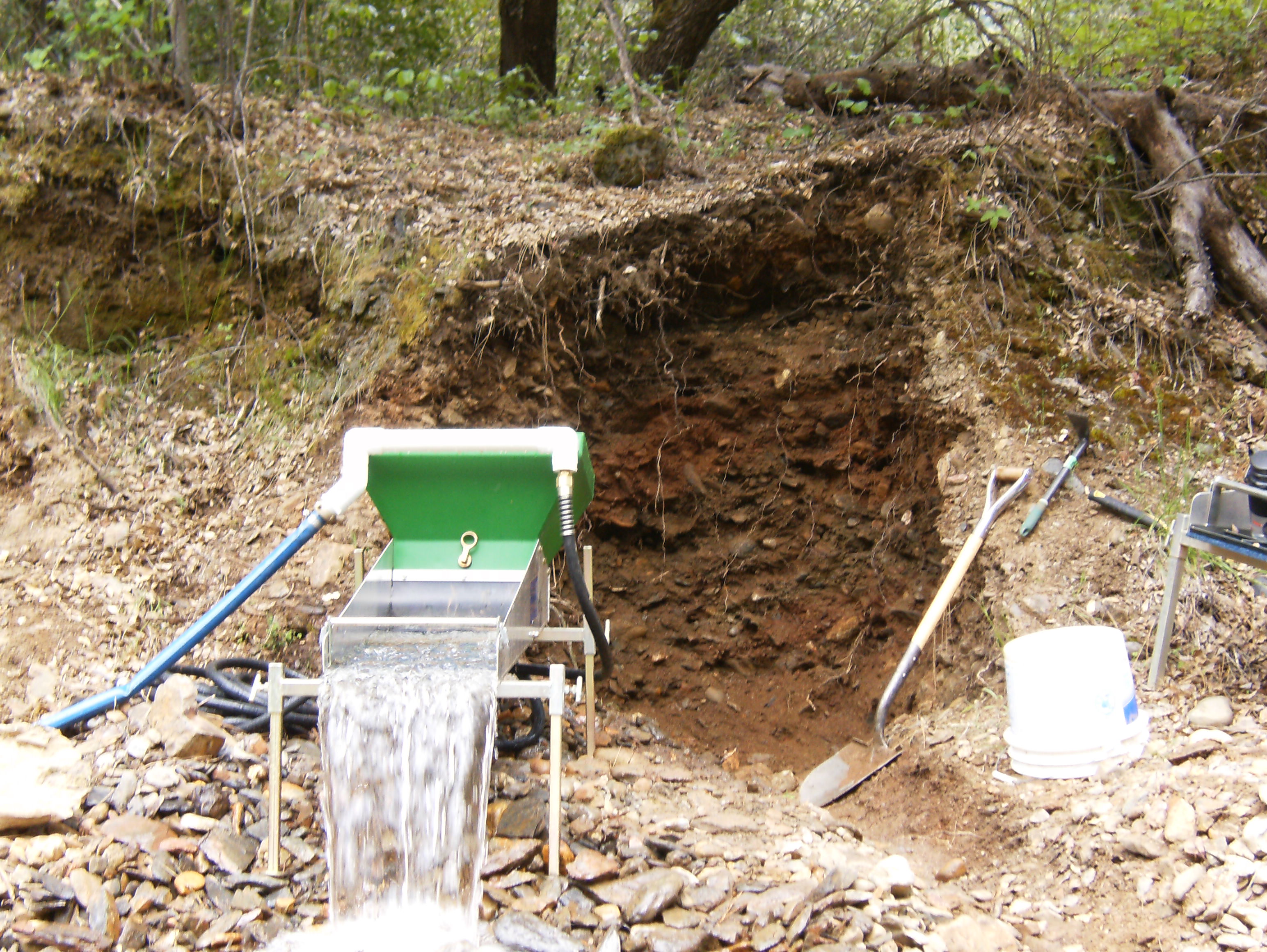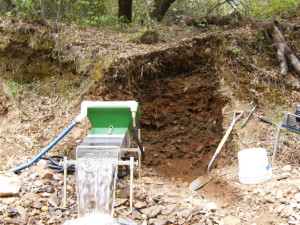|
According to the latest propaganda from the California State Water Resources Control Board, a permit is necessary for power sluicing or highbanking in the state. This activity has been allowed for decades. It involves the processing of gold-bearing material in a highbanker or power sluice. Water is pumped a short distance from a waterway, with the water being allowed to seep into the ground or evaporate so it doesn’t return to the stream, creek or river.
The Water Board recently posted permitting information on their website that states:
“You can discharge water and waste sediment from your highbanker or power sluice to land but you must first apply for a permit from the Regional Water Board responsible for the area where you’ll be mining. To apply for a permit, you must file a Report of Waste Discharge with the Regional Water Board. You cannot begin mining until the Regional Water Board approves your Report of Waste Discharge and notifies you that either your permit has been issued or that a permit is not required because the discharge will not create or threaten to create a condition of pollution or nuisance. The minimum fee for the permit is $1,120.00 but may be higher depending on the threat the discharge poses to water quality and the complexity of the discharge as determined by the Regional Water Board.” (See www.swrcb.ca.gov/water_issues/programs/cwa401/suction_dredge.shtml)
The Water Board threatens fines of $10,000 per day for violations!
The agency also states that a “Statement of Diversion and Use” is now necessary even if you have a “riparian water right.”
“If you are diverting water from a riparian parcel for use on that parcel, you must have a riparian water right or be legally entitled to use riparian water rights for the parcel and you must file a Statement of Water Diversion and Use (Statement) with the State Water Resources Control Board’s (State Water Board) Division of Water Rights for each point of diversion. The fee for filing a Statement of Diversion and Use is $50.00.”
However, this contradicts the fact that mining claimants are considered landowners with exclusive rights to possess and use that claim, and miners have “riparian rights” on mining claims that do not require permitting.
Real Property
The fact that mining claimants are landowners with exclusive rights, and their mining claims are real property, is well established:
30 USC § 26 states, “The locators of all mining locations on the public domain so long as they comply with the laws of the United States, and with State and local regulations not in conflict with the laws of the United States governing their possessory title, shall have the exclusive right of possession and enjoyment of all the surface included within the lines of their locations…”
US v. Shumway (9th Circuit Court of Appeals; No. 96-16480) “The owner of a mining or mill site claim does not need a patent, or a vested right to issuance of a patent, to possess and use the property for legitimate mining or milling purposes. A mining or mill site claim is ‘property in the fullest sense of the word.’”
Also in US v. Shumway: “The Supreme Court has established that a mining ‘claim’ is not a claim in the ordinary sense of the word—a mere assertion of a right—but rather is a property interest, which is itself real property in every sense, and not merely an assertion of a right to property.”
Riparian Rights
The Water Board explains a riparian right on their website and confirms that property owners adjacent to waterways have that right:
“A riparian right entitles the landowner to use a correlative share of the water flowing past his or her property. Riparian rights do not require permits, licenses, or government approval, but they apply only to the water which would naturally flow in the stream. Riparian rights do not entitle a water use to divert water to storage in a reservoir for use in the dry season or to use water on land outside of the watershed. Riparian rights remain with the property when it changes hands, although parcels severed from the adjacent water source generally lose their right to the water.” (Emphasis added.)
“…Riparian rights are not lost by non-use. A person who has a riparian right, but is not currently using water, has a ‘dormant’ riparian right. He or she can begin using water under that dormant right at any time. If the new riparian use results in a junior water right holder not having enough water, the junior water right holder must decrease his or her diversion and use of water until the senior water right holder has enough water to meet his or her reasonable needs. Riparian right holders on a stream course all have the same priority. If there is not enough water available for competing riparian users, they must share the available supply according to their needs. Generally in this situation, water used for interior domestic purposes, such as drinking, cooking and bathing, has the highest priority.” (See www.swrcb.ca.gov/waterrights/board_info/water_rights_process.shtml)
In 1928, the California Constitution was amended making the exercise of all water rights (both surface and groundwater) subject to a limitation of reasonable and beneficial use. In our view, utilizing water for the purposes of processing gold-bearing gravels through a power sluice or highbanker is a reasonable and beneficial use, and the Water Board confirms this opinion:
“Examples of beneficial uses include domestic use, irrigation, power production, municipal use, mining, industrial use, fish and wildlife preservation, aquaculture, recreation, stockwatering, water quality protection, frost protection (and) heat control.” (www.swrcb.ca.gov/waterrights/board_info/faqs.shtml)
The Water Board further asserts, in their “frequently asked questions” section, that no permit is required if you have a riparian water right:
“If you began using surface water or groundwater from a subterranean stream after 1914, when the State Water Commission Act was enacted, unless you have a riparian right you must apply for and receive approval from the State Water Board before using water.” (Emphasis added. See www.swrcb.ca.gov/waterrights/board_info/faqs.shtml)
Our View
This is another blatant attempt by the Water Board to stop mining in California with unelected officials promulgating unnecessary regulations and attempting to place new tax burdens on miners.
One of the primary purposes of the Mining Law of 1872 and its subsequent amendments is to promote the exploration and development of valuable mineral deposits in the United States. Despite the amendments that have been made over the years, that purpose has not changed.
It’s obvious that the Water Board is attempting to completely usurp the will of Congress by requiring a permit for simple exploration tasks like power sluicing and highbanking. Moreover, the agency’s requirement of $1,120 is site specific. If a miner went ahead and paid the fee and did not make a discovery at a particular location, he would have to pay another fee when he picked a new location to test! It’s impossible to know if a deposit exists unless you are allowed to process an adequate sample.
There are also no provisions in the Water Board rules that address permitting time frames. Could you imagine the time it would take for the Water Board to review and respond to 200 applications? How about 500, 1,000 or 3,000?
The Water Board is attempting to use the EPA Clean Water Act and NPDES (National Pollution Discharge Elimination System) permitting as their authority. But the sampling done by a miner within the ordinary high water mark and processed within that same area does not constitute the introduction of a pollutant. The materials that were already within the area will remain within the area.
Can the State of California legally require a permit for highbanking or power sluicing on a mining claim? In our view, the answer is “no.” A mining claim that includes a waterway is private property with riparian rights. If the miner is ensuring that his activities are “reasonably incident” to prospecting, mining or processing operations and the miner fills in his holes, this should satisfy the requirement to avoid “unnecessary or undue degradation” under 43 CFR §3809.415. And, as stated above, there is an obvious conflict with Congressional intent and no introduction of a pollutant.
How about on public lands that are open to claiming but not currently under claim? We also believe the answer to this question is “no.” The Mining Law of 1872 (USC 30 Chapter 2 § 22 ) states “…all valuable mineral deposits in lands belonging to the United States, both surveyed and unsurveyed, shall be free and open to exploration…”
Processing samples through a highbanker or power sluice is exploration. Again, as long as the miner is ensuring that his activities are “reasonably incident” to prospecting, mining or processing operations and the miner fills in his exploration holes, this should satisfy the requirement to avoid “unnecessary or undue degradation” under 43 CFR §3809.415
And, can they legally charge you $50 and require you to file a Statement of Diversion and Use? I don’t know the answer to this one, but we are looking into it. We’d like to hear your opinion. Please drop us a note at:
ICMJ Re: Highbanking Permits PO Box 2260 Aptos, CA 95001
|



I believe our regulators are not representing the best interest of Californian’s when it comes to water use. Farming and Mining are both critical to our National Security. Environmentalists and the Regulators are persuing an agenda to destroy the Farming and Mining Operations that have been the framework for a thriving Calfornia. I can’t see logical reason for regulators to review if miners can divert water for small highbanker operations. It is not the miners that are mis-managing water usage….it is the regulators. They let the forest get overgrown with trees and brush thru their regulations, and as a result the overgrown forests suck up the water that could be used by farmers, miners, cities, and even help the fish habitat with what is left over.
With reguard to the $50 fee to review water diversion…that is not looking at the real problem. I say that we need to massively down-size regulation, and the only way that can be done is not to fund hiring more regulators to perpetuate a Mis-Guided Agenda. These regulators don’t make decisions based on the scientific studies, but they keep hiring and squandering our tax dollars on more bad policy, and then asking for even more money thru fees.
Hopefully at some point Americans will stand up to this socialistic agenda that is all about making the government biggerand having the government controlling every aspect of our lives. Either the government is going to change for the better or they will find the Good Guys are becoming criminals…not because they have changed…but only because the government has redefined what the government wants you to do or not do!
Thanks AMRA for helping get the word out on what Our Government is doing to destroy America as we know it, and what we can do to Preserve our Freedoms for future generations.
Best Regards, John Meling